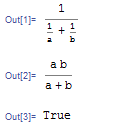Simplify[1/(1/a + 1/b)]
{ (a b)/(a + b) }
That doesn't look right. The given function has an infinite term for a = 0 and one for b = 0, while the result has one for (a + b) = 0. So that's probably the reason why:
a b/(a + b) === 1/(1/a + 1/b)
{ False }
though only a minute ago it Simplified it that way! Also
Simplify[1/(1/x)]
{ x }
seems to disregard the 1/0 case. Can anybody get me out of my confusion?


a b/(a + b) === 1/(1/a + 1/b)returnsFalsebecause they are not structurally the same (which is whatSameQ[]checks for). As for your actual question, Mathematica returns what is called a "generically correct" answer; see this for details. $\endgroup$